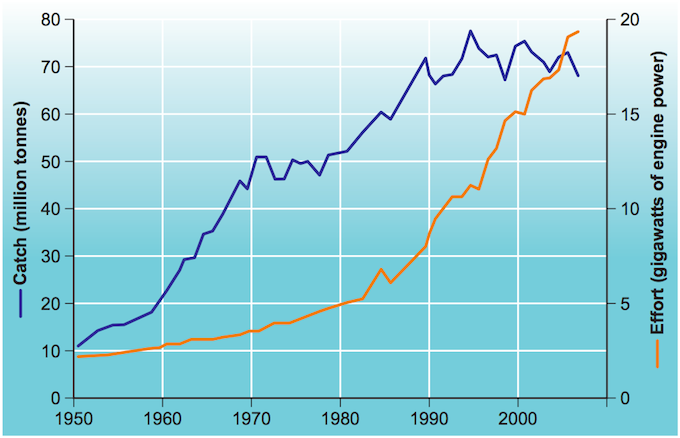Environment & Energy
Related: About this forumGlobal marine analysis suggests food chain collapse
Last edited Tue Oct 13, 2015, 08:30 AM - Edit history (1)
https://www.adelaide.edu.au/news/news81042.htmlTuesday, 13 October 2015
[font size=3]A world-first global analysis of marine responses to climbing human CO2 emissions has painted a grim picture of future fisheries and ocean ecosystems.
Published today in the journal Proceedings of the National Academy of Sciences (PNAS), marine ecologists from the University of Adelaide say the expected ocean acidification and warming is likely to produce a reduction in diversity and numbers of various key species that underpin marine ecosystems around the world.
“This ‘simplification’ of our oceans will have profound consequences for our current way of life, particularly for coastal populations and those that rely on oceans for food and trade,” says Associate Professor Ivan Nagelkerken, Australian Research Council (ARC) Future Fellow with the University’s Environment Institute.
Associate Professor Nagelkerken and fellow University of Adelaide marine ecologist Professor Sean Connell have conducted a ‘meta-analysis’ of the data from 632 published experiments covering tropical to artic waters, and a range of ecosystems from coral reefs, through kelp forests to open oceans.
…[/font][/font]
daleanime
(17,796 posts)Bookmarked.
ladjf
(17,320 posts)sue4e3
(731 posts)OKIsItJustMe
(19,938 posts)sue4e3
(731 posts)OKIsItJustMe
(19,938 posts)GliderGuider
(21,088 posts)
I like to call this graphic FRoEI: Fish Returned on Energy Expended. AKA Peak Fish.
OKIsItJustMe
(19,938 posts)This study has to do with climate change.
https://www.adelaide.edu.au/news/news81042.html
http://www.pnas.org/content/early/2015/10/06/1510856112.abstract
Ivan Nagelkerken1 and Sean D. Connell
Southern Seas Ecology Laboratories, School of Biological Sciences and The Environment Institute, The University of Adelaide, Adelaide, SA 5005, Australia
Edited by Nancy Knowlton, Smithsonian Institution, DC, Washington, and approved September 10, 2015 (received for review June 2, 2015)
[font size=4]Significance[/font]
[font size=3]People are not only concerned about climate change and its effects on plant and animal diversity but also about how humans are fundamentally changing the globe’s largest ecosystem that sustains economic revenue and food for many countries. We show that many species communities and ocean habitats will change from their current states. Ocean acidification and warming increase the potential for an overall simplification of ecosystem structure and function with reduced energy flow among trophic levels and little scope for species to acclimate. The future simplification of our oceans has profound consequences for our current way of life, particularly for coastal populations and those that rely on oceans for food and trade. [/font]
[font size=4]Abstract[/font]
[font size=3]Rising anthropogenic CO₂ emissions are anticipated to drive change to ocean ecosystems, but a conceptualization of biological change derived from quantitative analyses is lacking. Derived from multiple ecosystems and latitudes, our metaanalysis of 632 published experiments quantified the direction and magnitude of ecological change resulting from ocean acidification and warming to conceptualize broadly based change. Primary production by temperate noncalcifying plankton increases with elevated temperature and CO₂, whereas tropical plankton decreases productivity because of acidification. Temperature increases consumption by and metabolic rates of herbivores, but this response does not translate into greater secondary production, which instead decreases with acidification in calcifying and noncalcifying species. This effect creates a mismatch with carnivores whose metabolic and foraging costs increase with temperature. Species diversity and abundances of tropical as well as temperate species decline with acidification, with shifts favoring novel community compositions dominated by noncalcifiers and microorganisms. Both warming and acidification instigate reduced calcification in tropical and temperate reef-building species. Acidification leads to a decline in dimethylsulfide production by ocean plankton, which as a climate gas, contributes to cloud formation and maintenance of the Earth’s heat budget. Analysis of responses in short- and long-term experiments and of studies at natural CO₂ vents reveals little evidence of acclimation to acidification or temperature changes, except for microbes. This conceptualization of change across whole communities and their trophic linkages forecast a reduction in diversity and abundances of various key species that underpin current functioning of marine ecosystems.
…[/font][/font]
GliderGuider
(21,088 posts)As with so-called "Peak Oil", the first sign of a resource extraction peak is the increasing resource cost for extracting the same amount of product, especially when the resource investment increases by an order of magnitude or more for the same return. Typically what one sees is an extraction plateau that is extended but not lifted by the addition of ever more energy resources to the task. That's what the graph in my comment speaks to. It's just another way of saying we are destroying the oceans' ability to sustain human predators.
It has nothing to do with "all the fish are gone" or "all the oil is gone". That's a red herring, if you'll pardon the expression.
OKIsItJustMe
(19,938 posts)However, the various usages of “Peak” (i.e. “Hubbert peak theory”) have to do with resource depletion. (There is a finite amount of some “stuff” available {oil, phosphorus…} which we are, to some extent, exhausting… This is also true with the oceans, however, fisheries, unlike oil fields, are a “renewable resource” if managed properly.)
This study is about a related, but different, concern.
GliderGuider
(21,088 posts)We take too many fish too fast, and the climate keeps them from replenishing, which amplifies the effect of our predation.
I expect we'll see the same thing with land agriculture, as climate change messes with the weather just as we are depleting the soils. Climate change is the impact amplifier that we hadn't counted on, either on land or at sea. Productivity gets squeezed from both above and below.